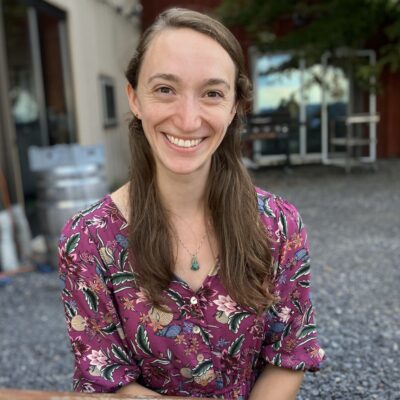Postdoc Spotlight: Alyssa Kaganer

September 29, 2023
Alyssa Kaganer is a postdoc in public and ecosystem health in the Cornell Wildlife Health Lab from East Berne, New York. She holds a Ph.D. from the Cornell-Smithsonian Joint Graduate Training Program, and her research at Cornell focuses on the management of free-ranging wildlife. She is a recipient of a Postdoc Achievement Award for Excellence in Mentoring as part of Cornell’s celebration of National Postdoc Appreciation Week 2023.
What is your area of research, scholarship, or work and why is it important?
My research focuses on development and deployment of new tools for management of free-ranging wildlife with the goal of promoting healthy, sustainable wildlife populations. I have projects seeking to improve our ability to detect chronic wasting disease in white-tailed deer through use of new diagnostics and via an expanded understanding of host-pathogen-microbiome interactions in the disease system. Additionally, I work to develop environmental DNA and RNA tools to enable non-invasive detection of threatened amphibian and reptile species and their diseases on the landscape. This can improve our ability to protect threatened species and preserve biodiversity for the benefit of all people and ecosystems.
What are the broader implications of this research, scholarship, or work?
The health of all people, domestic animals, wildlife, and ecosystems are intrinsically connected; imbalances or collapses of health in any one of these components can have cascading impacts on all other components of this network, as we’ve seen with recent disease spillover events like COVID-19 and highly pathogenic avian influenza. My research seeks to expand our knowledge and toolkit for protection of wildlife health, in furtherance of this One Health principle. A key part of this work is empowering the next generation of wildlife and One Health professionals by providing them the support and tools they need to advance their own research interests.
What does receiving a Postdoc Achievement Award mean to you?
Receiving a Postdoc Achievement Award is a huge honor that further solidifies the importance of prioritizing mentorship as a core component of my professional goals. I am deeply grateful for the exceptional mentorship example set by my PI, Dr. Krysten Schuler, and countless other personal and professional mentors in my life. I am most fortunate to have the opportunity to work with so many exceptional students and trainees; it is a joy to watch each of them develop independent research skills and interests, and I am honored to be a part of their training team.
What hobbies or activities do you enjoy in your spare time?
When not in lab, I can usually be found hiking or biking the beautiful Ithaca trail networks with my partner and our dog, training future guide dogs, baking, knitting, or lost in a good book.
Why did you choose Cornell?
I chose to come back to Cornell for the opportunity to join the Cornell Wildlife Health Lab (CWHL). This group sits at an exciting intersection of research and management through their partnership with the New York State Department of Environmental Conservation via the New York State Wildlife Health Program. This positions CWHL ideally to span research from ideation to implementation and ensures that the work I’m doing has a direct path to benefit free-ranging wildlife of New York. The team at CWHL is composed of creative, brilliant scientists; I knew it would be a perfect place for me to learn and grow as a researcher.
What is next for you?
I plan to continue leveraging my molecular biology and genomics training to advance the field of wildlife health. I also hope to continue working with students and trainees to help them discover the fun (and sometimes frustration!) of research.
Do you have any advice for current graduate students?
Have confidence in yourself. There is an endless, often contradictory pool of advice available from peers and the online community. Take what serves you and leave the rest behind. Graduate school is really hard and the “right” way to be a graduate student is the unique way that works best for you. (But also definitely get a citation manager if you don’t already have one).
